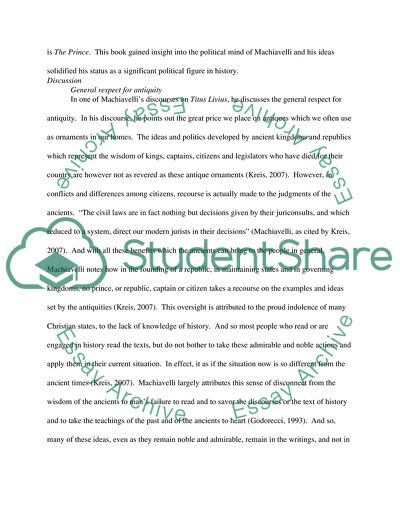Cite this document
(The Ideas of Machiavelli Essay Example | Topics and Well Written Essays - 1750 words, n.d.)
The Ideas of Machiavelli Essay Example | Topics and Well Written Essays - 1750 words. https://studentshare.org/philosophy/1739082-choose-either-a-philosopher-or-a-religious-leader-other-than-buddha-or-jesus-and-write-a-5-7-page-discussing-their-idea
The Ideas of Machiavelli Essay Example | Topics and Well Written Essays - 1750 words. https://studentshare.org/philosophy/1739082-choose-either-a-philosopher-or-a-religious-leader-other-than-buddha-or-jesus-and-write-a-5-7-page-discussing-their-idea
(The Ideas of Machiavelli Essay Example | Topics and Well Written Essays - 1750 Words)
The Ideas of Machiavelli Essay Example | Topics and Well Written Essays - 1750 Words. https://studentshare.org/philosophy/1739082-choose-either-a-philosopher-or-a-religious-leader-other-than-buddha-or-jesus-and-write-a-5-7-page-discussing-their-idea.
The Ideas of Machiavelli Essay Example | Topics and Well Written Essays - 1750 Words. https://studentshare.org/philosophy/1739082-choose-either-a-philosopher-or-a-religious-leader-other-than-buddha-or-jesus-and-write-a-5-7-page-discussing-their-idea.
“The Ideas of Machiavelli Essay Example | Topics and Well Written Essays - 1750 Words”. https://studentshare.org/philosophy/1739082-choose-either-a-philosopher-or-a-religious-leader-other-than-buddha-or-jesus-and-write-a-5-7-page-discussing-their-idea.


